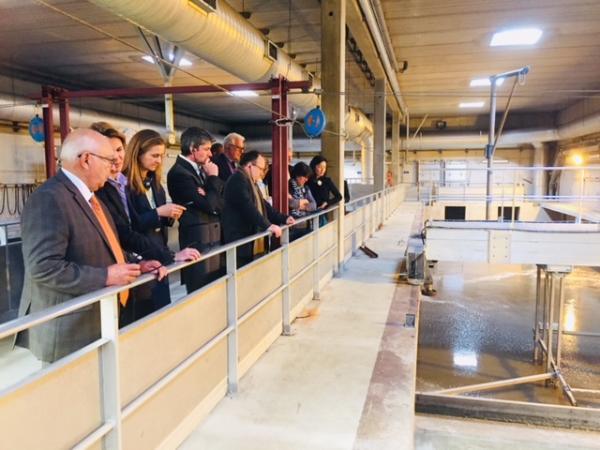
- This is the first direct financing from the EIB dedicated to the water sector granted under the Juncker Plan in France.
- The future wastewater treatment plant will help to meet the needs of a growing population of up to 500 000 people, while contributing fully to the circular economy with its use of the biogas produced by water treatment waste and the recycling of all waste sludge through a composting channel.
European Investment Bank (EIB – the EU bank) Vice-President Ambroise Fayolle and Syndicat Mixte pour l’Aménagement Hydraulique (SIAH) du Croult et du Petit Rosne President Guy Messager today announced the signature of a EUR 76m finance contract for the construction of the new, “next generation” wastewater treatment plant in Bonneuil, Val d'Oise (France). Vice-President for European Affairs of the Île-de-France Region Stéphanie Von Euw and councillors from the municipalities involved in the project were also in attendance.
This is a large-scale financing operation with major economic and environmental impact handled by a French closed joint association specialised in wastewater treatment, and is the first of its kind under the Investment Plan for Europe (the Juncker Plan). The EIB's excellent (AAA) credit rating and the EU guarantee enable SIAH to benefit from attractive financial terms tailored to this kind of project including a long financing maturity (28 years).
In concrete terms, this EU financing will make it possible to provide the region will a “next generation” wastewater treatment plant applying the circular economy approach, reducing overall energy use and creating additional revenue. Water treatment waste (sludge) will be used to produce biogas, which will then be pumped into the municipal gas network. Waste sludge will be fully recycled through a composting channel.
The future wastewater treatment plant in Bonneuil (France) will have a treatment capacity of 500 000 population equivalent (compared to 300 000 population equivalent for the current plant), while guaranteeing full compliance with discharge standards. The future plant will therefore make it possible to meet the growing requirements of the connected population and industrial and commercial facility projects such as Paris airport – Triangle de Gonesse and the Louvres-Puiseux eco-district.
“The project will have a major environmental impact for the area and its residents. It is also the first French project financed by the EIB in this sector under the Juncker Plan,” said EIB Vice-President Ambroise Fayolle. “By financing the construction of innovative, circular economy-based facilities in this way, we support the sustainable development of a region. We create jobs. And we guarantee better access to water resources while ensuring reliable supply in line with our environmental action priority. The Juncker Plan is continuing its successful development in France with 120 operations approved so far, representing a total financing amount of EUR 9.3bn. These are expected to mobilise EUR 42.3bn in additional investment.”
“This financing is key for SIAH,” emphasised SIAH President Guy Messager.
“It will enable us to increase the treatment capacity of our plant and adapt it to pressing and future issues in the east of Val d'Oise. However, it is also an opportunity for us to move our plant towards the environmentally responsible management model that SIAH is developing across all of its activities. The EIB financing provides support for SIAH's strategic choices for the common good. We should not forget that all of our actions converge on one core objective outlined by the Water Framework Directive: returning watercourses to good environmental status.”
“I am very proud of the signature of the first project to be financed by the EIB via the Juncker Plan in Val d'Oise. It is a large-scale project with major environmental impact. The Region must act as facilitator to enable those on the ground – local authorities, companies and associations – to develop and access EU financing, including that provided by the EIB,” said Vice-President for European Affairs of the Île-de-France Region Stéphanie Von Euw.
“This innovative wastewater treatment project is remarkable on more than one level: improving water quality, producing less sewage sludge and using the latter to generate energy. It is a concrete example of how the circular economy concept can be applied to benefit people and the environment. It also shows the local and concrete action of the European Fund for Strategic Investments, which was launched jointly by the EIB and the European Commission,” added European Commissioner for the Environment, Maritime Affairs and Fisheries Karmenu Vella.
The EU bank is pursuing concrete actions to finance projects that contribute to economic and sustainable development and have a direct impact on people's daily lives. In the water and sewerage sector, the EIB has dedicated EUR 1.6bn to this environmental priority since 2008 in France, supporting projects to develop and modernise plants and systems at the heart of French towns, cities and regions.

Photographer: Anne-Cécile Auguin ©EIB
Download original

Photographer: Anne-Cécile Auguin ©EIB
Download original

Photographer: Anne-Cécile Auguin ©EIB
Download original

Photographer: Anne-Cécile Auguin ©EIB
Download original

©EIB
Download original